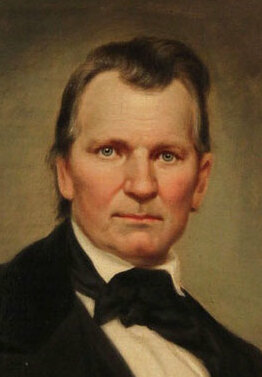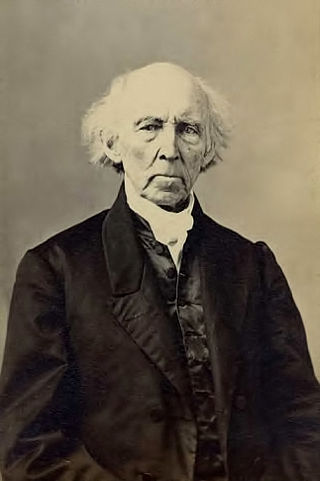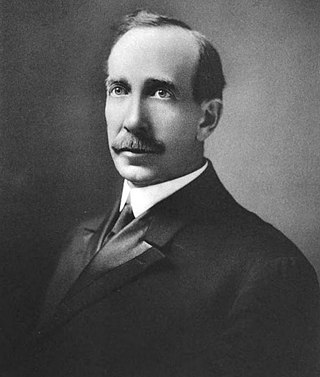
Hopkinton is a town in Middlesex County, Massachusetts, United States, 25 miles (40 km) west of Boston. The town is best known as the starting point of the Boston Marathon, held annually on Patriots' Day each April, and as the headquarters for the Dell EMC corporation.

Willard Richards was an early leader in the Latter Day Saint movement. He served as second counselor to church president Brigham Young in the First Presidency of the Church of Jesus Christ of Latter-day Saints from 1847 until his death.

Harriet E. Wilson was an African-American novelist. She was the first African American to publish a novel in North America.

Daniel Smith Donelson was a Tennessee planter, politician, and soldier. The historic Fort Donelson was named for him when he was serving as a Brigadier in the Tennessee militia, early in the American Civil War. He was commissioned as a regular Confederate general, serving notably at the battles of Perryville and Stones River.

Robert Dollard was an American attorney and politician. A native of Massachusetts, he was a Union Army veteran of the American Civil War and attained the rank of major. After the war, he moved to Illinois, where he studied law and was admitted to the bar. He later moved to South Dakota and served as its first attorney general.

Francis Julius LeMoyne was a 19th-century American medical doctor and philanthropist from Washington, Pennsylvania. Responsible for creating the first crematory in the United States, he was also an abolitionist, founder of Washington's first public library, co-founder of the Washington Female Seminary, and an instrumental benefactor to the LeMoyne Normal and Commercial School, to which he made a $20,000 donation in 1870.

Chester Dewey was an American botanist, antislavery activist, clergyman and educator.
John A. Poindexter was a colonel in the Confederate Army during the American Civil War. He and Joseph C. Porter were the primary recruiting commanders in northern Missouri during 1862.

Samuel Drake Lockwood was an Illinois lawyer and politician who served as the state's Attorney General, Secretary of State, Justice of the Illinois Supreme Court and the state's trustee on the board of the Illinois Central Railroad.
Nicholas Charles Arnould Hentz was a French revolutionary and politician. After fleeing France in 1815, he assumed the name Charles Arnould.

Beverly Francis Carradine was an American Methodist minister and a leading evangelist for the holiness movement. He was a productive author, writing primarily on the subject of sanctification. The patriarch of the Carradine family, he was the grandfather of actor John Carradine and great-grandfather of actors David, Keith, and Robert Carradine.

John James Hattstaedt was a musician and teacher known as founder and president of the American Conservatory of Music, which he established in Chicago in 1886. It was the oldest private degree-granting school of music in the Midwest. He served as its president until becoming ill six months before his death. At that time, the Conservatory had an enrollment of over 3,000 students.

John Sella Martin escaped slavery in Alabama and became an influential abolitionist and pastor in Boston, Massachusetts. He was an activist for equality before the American Civil War and travelled to England to lecture against slavery. When he returned, he preached in Presbyterian churches in Washington, D.C.

Caroline A. Soule, was an American novelist, poet, religious writer, editor, and ordained Universalist minister, who was in 1880 the first woman to be ordained as a minister in the United Kingdom; first president and one of the founders of the Woman's Centenary Aid Association, the earliest national organization of American church women; and the first Universalist Church of America missionary when sent to Scotland in 1878.

Charles Henry Thompson served as chief justice of the Illinois Supreme Court in 1945, 1946, 1949, and 1950 after being elected to the Illinois Supreme Court in 1942. He was born on December 11, 1882 near Mount Vernon, Posey County, Indiana to Lewis Thompson, a farmer, and his wife Emma Monroe Thompson. In 1884, he and his family moved to Harrisburg in Saline County, Illinois. By 1910, his father had begun mining coal, and Charles was working as a bookkeeper in the coal office. In 1914, Charles married Ethel K. Knight of Harrisburg.
Benjamin Noyes Hulburd was an American attorney, politician, and judge who served as an associate justice of the Vermont Supreme Court from 1955 to 1959, and chief justice from 1959 to 1963.

Frank Leslie Fish was a Vermont attorney and judge. He was most notable for his service as an associate justice of the Vermont Supreme Court from 1926 to 1927.

Fred M. Butler was a Vermont attorney and judge. He is notable for his service as an associate justice of the Vermont Supreme Court from 1923 to 1926.

William H. Taylor was a Vermont attorney, politician, and judge. He was notable for his service as an associate justice of the Vermont Supreme Court from 1913 to 1926.
George Howe was a Vermont attorney and politician. Howe was most notable for his service as United States Attorney for the District of Vermont from 1861 to 1864 and a member of the Vermont Senate from 1874 to 1875.
















